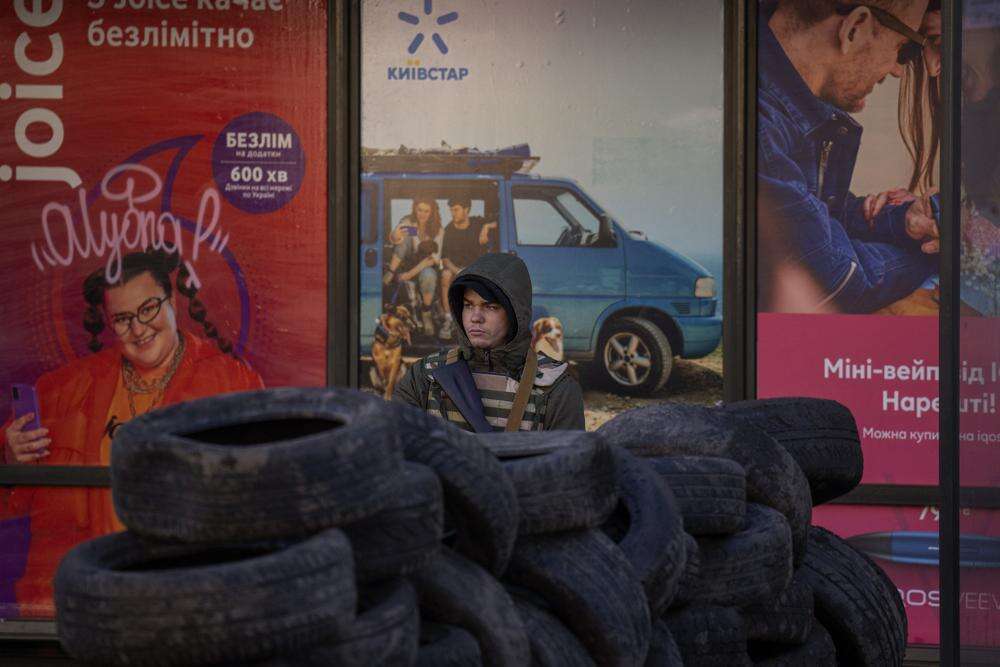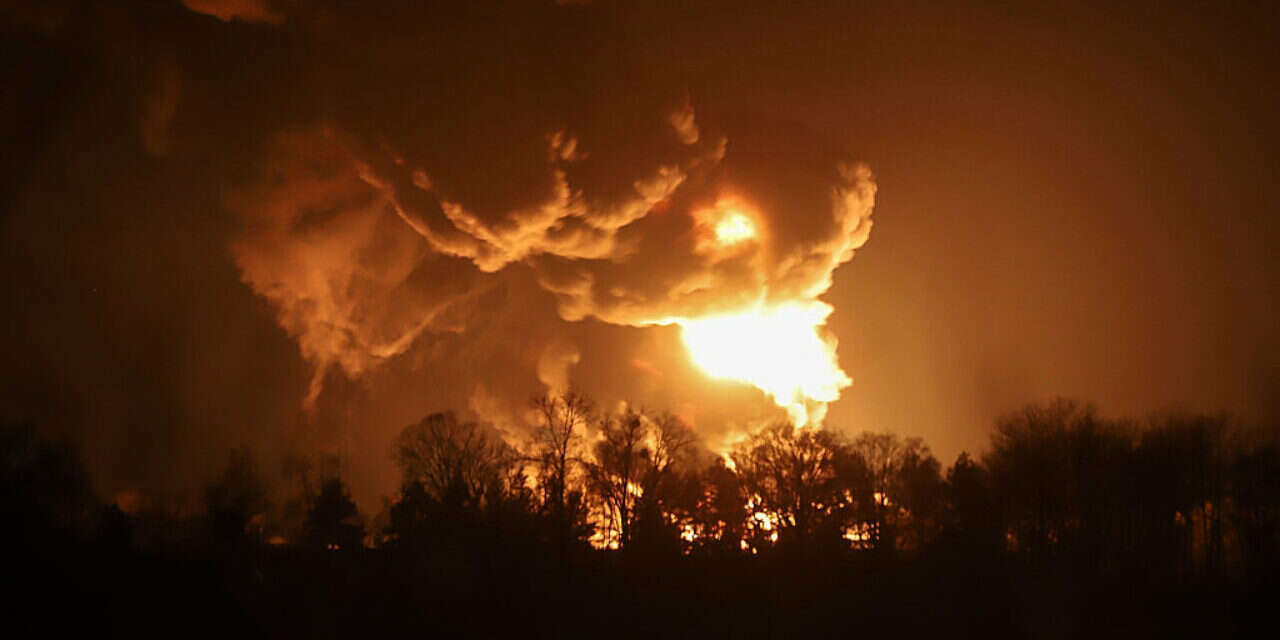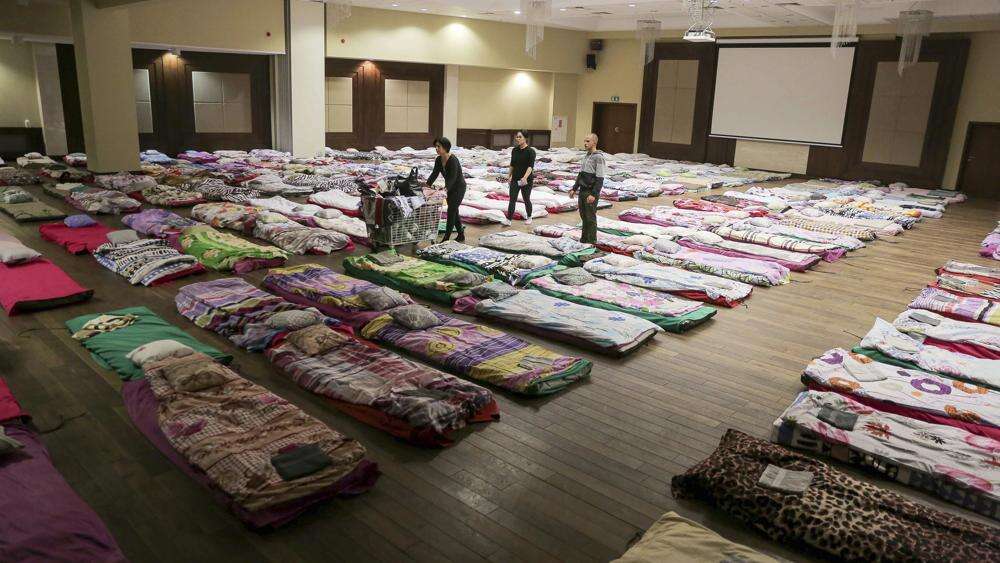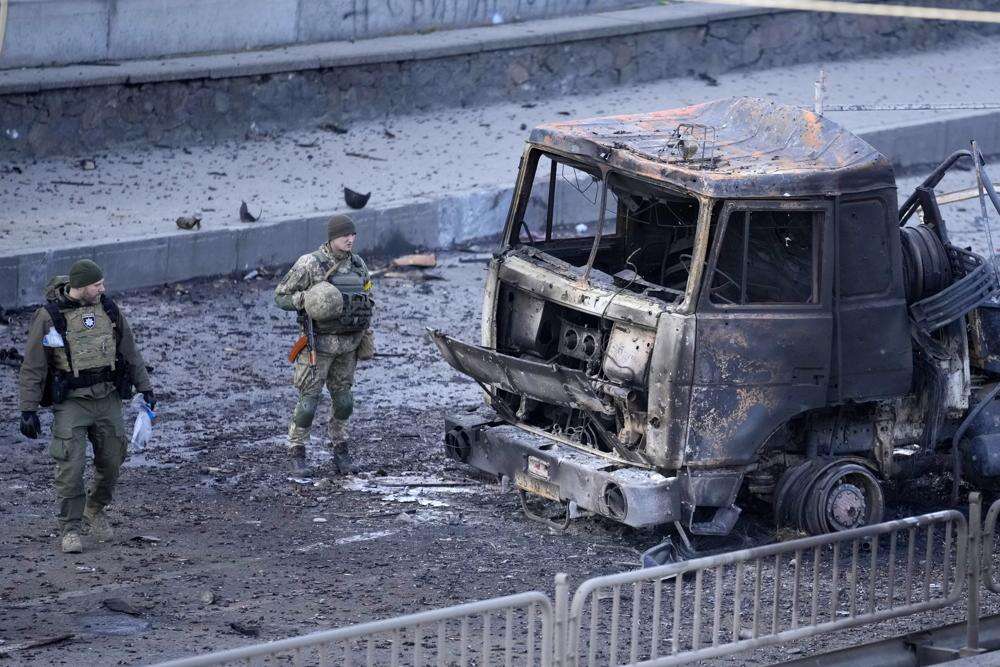On Saturday, the United States and European nations agreed to impose the most potentially crippling financial penalties yet on Russia over its unrelenting invasion of Ukraine, going after the central bank reserves that underpin the Russian economy and severing some Russian banks from a vital global financial network.
Follow Israel Hayom on Facebook, Twitter, and Instagram
The decision, announced as Ukrainian forces battled Saturday to hold Russian forces back from Ukraine's capital and residents sheltered in subway tunnels, basements and underground garages, has potential to spread the pain of Western retaliation for President Vladimir Putin's invasion to ordinary Russians far more than previous rounds of penalties.
"Putin embarked on a path aiming to destroy Ukraine, but what he is also doing, in fact, is destroying the future of his own country," EU Commission President Ursula von der Leyen said.
The US, European Union, Britain and other allies have steadily stepped up the intensity of their sanctions since Russia launched the invasion late last week.
While US and European officials made clear they still were working out the mechanics of how to implement the latest measures, and intend to spare Russia's oil and natural gas exports, the sanctions in total potentially could amount to some of the toughest levied on a nation in modern times. If fully carried out as planned, the measures will severely damage the Russian economy and markedly constrain its ability to import and export goods.
The US and European allies announced the moves in a joint statement as part of a new round of financial sanctions meant to "hold Russia to account and collectively ensure that this war is a strategic failure for Putin."
The central bank restrictions target access to the more than $600 billion in reserves that the Kremlin has at its disposal, and are meant to block Russia's ability to support the ruble as it plunges in value amid tightening Western sanctions.
US officials said Saturday's steps were framed to send the ruble into "free fall" and promote soaring inflation in the Russian economy.
The decline of the ruble would likely send inflation soaring, which would hurt everyday Russians and not just the Russian elites who were the targets of the original sanctions. The resulting economic disruption, if Saturday's measures are as harsh as described, could leave Putin facing political unrest at home.
Analysts predicted intensifying runs on banks by Russians, and falling government reserves as Russians scrambled to sell their targeted currency for safer assets.
The US officials noted that previously announced sanctions have already had an impact on Russia, bringing its currency to its lowest level against the dollar in history and giving its stock market the worst week on record.
Saturday's move also includes cutting key Russian banks out of the SWIFT financial messaging system, which daily moves countless billions of dollars around more than 11,000 banks and other financial institutions around the world.
The fine print of the sanctions was still being ironed out over the weekend, officials said, as they work to limit the impact of the restrictions on other economies and European purchases of Russian energy.

Allies on both sides of the Atlantic also considered the SWIFT option in 2014, when Russia invaded and annexed Ukraine's Crimea and backed separatist forces in eastern Ukraine. Russia declared then that kicking it out of SWIFT would be equivalent to a declaration of war. The allies – criticized ever after for responding too weakly to Russia's 2014 aggression – shelved the idea back then. Russia since then has tried to develop its own financial transfer system, with limited success.
The US has succeeded before in persuading the Belgium-based SWIFT system to kick out a country – Iran, over its nuclear program. But kicking Russia out of SWIFT could also hurt other economies, including those of the US and key ally Germany.
Only rarely has the West and its allies fired a full salvo of its available financial weapons on a country. Iran and North Korea, two previous targets, had far smaller roles in the world economy, while Russia, with its enormous petroleum reserves, plays a much bigger role in global trade, and parts of Europe depend on its natural gas.
The disconnection from SWIFT announced by the West on Saturday is partial, leaving Europe and the United States room to escalate penalties later. Officials said they had not fully settled on which banks would be cut off.
Announcing the measures in Brussels, the EU Commission president, von der Leyen, said she would push the bloc to "paralyze the assets of Russia's Central bank" so that its transactions would be frozen. Cutting several commercial banks from SWIFT "will ensure that these banks are disconnected from the international financial system and harm their ability to operate globally," she added.
"Cutting banks off will stop them from conducting most of their financial transactions worldwide and effectively block Russian exports and imports," she added.
Getting the EU on board for sanctioning Russia through SWIFT had been a tough process since EU trade with Russia amounted to 80 billion euros, about 10 times as much as the United States, which had been an early proponent of such measures.
Germany specifically had balked at the measure since it could hit them hard. But Foreign Minister Annalena Baerbock said in a statement that "after Russia's shameless attack ... we are working hard on limiting the collateral damage of decoupling [Russia] from SWIFT so that it hits the right people. What we need is a targeted, functional restrictions of SWIFT."
As another measure, the allies announced a commitment "to taking measures to limit the sale of citizenship – so-called golden passports – that let wealthy Russians connected to the Russian government become citizens of our countries and gain access to our financial systems."
The group also announced the formation this week of a trans-Atlantic task force to ensure that these and other sanctions on Russia are implemented effectively through information sharing and asset freezes.
"These new sanctions, which include removing several Russian banks from SWIFT and sanctioning Russia's central bank, are likely to cause serious damage to the Russian economy and its banking system," said Clay Lowery, executive vice president of the Institute of International Finance. "While details on how the new sanctions affect energy are still emerging, we do know that sanctions on its central bank will make it more difficult for Russia to export energy and other commodities."
Also on Saturday, Russia unleashed a wave of attacks on Ukraine targeting airfields and fuel facilities in what appeared to be the next phase of an invasion that has been slowed by fierce resistance.
Massive explosions lit up the sky early Sunday south of the capital, Kyiv, where people hunkered down in homes, underground garages and subway stations in anticipation of a full-scale assault by Russian forces.

Flames billowed into the sky before dawn from an oil depot near an air base in Vasylkiv, where there has been intense fighting, according to the town's mayor. Zelenskyy's office said another explosion occurred at the civilian Zhuliany airport.
Zelenskyy's office also said Russian forces blew up a gas pipeline in Kharkiv, the country's second-largest city, prompting the government to warn people to protect themselves from the smoke by covering their windows with damp cloth or gauze.
"We will fight for as long as needed to liberate our country," Zelenskyy vowed.
Terrified men, women and children sought safety inside and underground, and the government maintained a 39-hour curfew to keep people off the streets. More than 150,000 Ukrainians fled for Poland, Moldova and other neighboring countries, and the United Nations warned the number could grow to 4 million if fighting escalates.
Putin hasn't disclosed his ultimate plans, but Western officials believe he is determined to overthrow Ukraine's government and replace it with a regime of his own, redrawing the map of Europe and reviving Moscow's Cold War-era influence.
To aid Ukraine's ability to hold out, the US pledged an additional $350 million in military assistance to Ukraine, including anti-tank weapons, body armor and small arms. Germany said it would send missiles and anti-tank weapons to the besieged country and that it would close its airspace to Russian planes. Countries followed suit with Bulgaria, the Czech Republic, Estonia, Germany, Poland, Britan, Finland and Ireland decising to close their airspace as well.
In related news, SpaceX billionaire Elon Musk said on Saturday that the company's Starlink satellite broadband service is available in Ukraine and SpaceX is sending more terminals to the country, whose internet has been disrupted due to the Russian invasion.
"Starlink service is now active in Ukraine. More terminals en route," Musk tweeted.
He was responding to a tweet by a Ukraine government official who asked Musk to provide the embattled country with Starlink stations.
Elon Musk, while you try to colonize Mars, Russia is trying to occupy Ukraine. While your rockets successfully land from space, Russian rockets attack Ukrainian civilians, Ukraine's Vice Prime Minister Mykhailo Fedorov tweeted.
Internet connectivity in Ukraine has been affected by the Russian invasion, particularly in the southern and eastern parts of the country where fighting has been heaviest, internet monitors said on Saturday.
Meanwhile, The Guardian reported on Sunday morning that Ukrainian soldiers believed to have died while defending Ukraine's Snake Island after telling a Russian warship to "go f*** yourself" may still be alive.
Ukraine's State Border Guard said in a Facebook post, "We [have a] strong belief that all Ukrainian defenders of Zmiinyi (Snake) Island may be alive."
According to initial reports, following a Russian air and sea bombardment, the 13 border guard died after refusing to surrender the island located 300 kilometers (186 miles) of the Crimean Peninsula.
When asked to lay down their weapons by an officer on board the Russian warship, the Ukrainian reportedly responded with a defiant "Russian warship, go f*** yourself."
It was unclear how much territory Russian forces had seized or to what extent their advance had been stalled. Britain's Ministry of Defense said "the speed of the Russian advance has temporarily slowed likely as a result of acute logistical difficulties and strong Ukrainian resistance."
A senior US defense official said more than half the Russian combat power that was amassed along Ukraine's borders had entered the country and Moscow has had to commit more fuel supply and other support units inside Ukraine than originally anticipated. The official spoke on condition of anonymity to discuss internal US assessments.
The curfew forcing everyone in Kyiv inside was set to last through Monday morning. The relative quiet of the capital was sporadically broken by gunfire.
Fighting on the city's outskirts suggested that small Russian units were trying to clear a path for the main forces. Small groups of Russian troops were reported inside Kyiv, but Britain and the US said the bulk of the forces were 19 miles (30 kilometers) from the city's center as of Saturday afternoon.
Russia claims its assault on Ukraine from the north, east and south is aimed only at military targets, but bridges, schools and residential neighborhoods have been hit.
Ukraine's Health Minister Viktor Liashko reported Saturday that 198 people, including three children, had been killed and more than 1,000 others wounded during Europe's largest land war since World War II. It was unclear whether those figures included both military and civilian casualties.
A missile struck a high-rise apartment building in Kyiv's southwestern outskirts near one of the city's two passenger airports, leaving a jagged hole of ravaged apartments over several floors. A rescue worker said six civilians were injured.

Ukraine's ambassador to the US, Oksana Markarova, said troops in Kyiv were fighting Russian "sabotage groups." Ukraine says some 200 Russian soldiers have been captured and thousands killed.
Markarova said Ukraine was gathering evidence of shelling of residential areas, kindergartens and hospitals to submit to The Hague as possible crimes against humanity.
Zelenskyy reiterated his openness to talks with Russia in a video message, saying he welcomed an offer from Turkey and Azerbaijan to organize diplomatic efforts, which so far have faltered.
The Kremlin confirmed a phone call between Putin and Azerbaijani President Ilham Aliyev but gave no hint of restarting talks. A day earlier, Zelenskyy offered to negotiate a key Russian demand: abandoning ambitions of joining NATO.
Putin sent troops into Ukraine after denying for weeks that he intended to do so, all the while building up a force of almost 200,000 troops along the countries' borders. He claims the West has failed to take seriously Russia's security concerns about NATO, the Western military alliance that Ukraine aspires to join. But he has also expressed scorn about Ukraine's right to exist as an independent state.
The effort was already coming at great cost to Ukraine, and apparently to Russian forces as well.
Ukrainian artillery fire destroyed a Russian train delivering diesel to troops heading toward Kyiv from the east, said Anton Gerashchenko, an adviser at the interior ministry.
The country's Infrastructure Ministry said a Russian missile was shot down early Saturday as it headed for the dam of the sprawling reservoir that serves Kyiv. The government also said a Russian convoy was destroyed. Video images showed soldiers inspecting burned-out vehicles after Ukraine's 101st brigade reported destroying a column of two light vehicles, two trucks and a tank. The claim could not be verified.
Highways into Kyiv from the east were dotted with checkpoints manned by Ukrainian troops and young men in civilian clothes carrying automatic rifles. Low-flying planes patrolled the skies, though it was unclear if they were Russian or Ukrainian.
In addition to Kyiv, the Russian assault appeared to focus on Ukraine's economically vital coastal areas, from near the Black Sea port of Odesa in the west to beyond the Azov Sea port of Mariupol in the east.
Ukrainian soldiers in Mariupol guarded bridges and blocked people from the shoreline amid concerns the Russian navy could launch an assault from the sea.
"I don't care anymore who wins and who doesn't," said Ruzanna Zubenko, whose large family was forced from their home outside Mariupol after it was badly damaged by shelling. "The only important thing is for our children to be able to grow up smiling and not crying."
Fighting also raged in two eastern territories controlled by pro-Russia separatists. Authorities in Donetsk said hot water supplies to the city of about 900,000 were suspended because of damage to the system by Ukrainian shelling.
The US government urged Zelenskyy early Saturday to evacuate Kyiv but he turned down the offer, according to a senior American intelligence official with direct knowledge of the conversation. Zelenskyy issued a defiant video recorded on a downtown street, saying he remained in the city.
"We aren't going to lay down weapons. We will protect the country," he said. "Our weapon is our truth, and our truth is that it's our land, our country, our children. And we will defend all of that."
Hungary and Poland both opened their borders to Ukrainians.

Refugees arriving in the Hungarian border town of Zahony said men between the ages of 18 and 60 were not being allowed to leave Ukraine.
"My son was not allowed to come. My heart is so sore, I'm shaking," said Vilma Sugar, 68.
At Poland's Medyka crossing, some said they had walked for 15 miles (35 kilometers) to reach the border.
"They didn't have food, no tea, they were standing in the middle of a field, on the road, kids were freezing," Iryna Wiklenko said as she waited on the Polish side for her grandchildren and daughter-in-law to make it across.
Officials in Kyiv urged residents to stay away from windows to avoid debris or bullets.
Subscribe to Israel Hayom's daily newsletter and never miss our top stories!
Shelves were sparsely stocked at grocery stores and pharmacies, and people worried how long food and medicine supplies might last.
The US and its allies have beefed up forces on NATO's eastern flank but so far have ruled out deploying troops to fight Russia. Instead, the US, the European Union and other countries have slapped wide-ranging sanctions on Russia, freezing the assets of businesses and individuals including Putin and his foreign minister.
Dmitry Medvedev, the deputy head of Russia's Security Council, warned that Moscow could react by opting out of the last remaining nuclear arms pact, freezing Western assets and cutting diplomatic ties.
"There is no particular need in maintaining diplomatic relations," Medvedev said. "We may look at each other in binoculars and gunsights."




